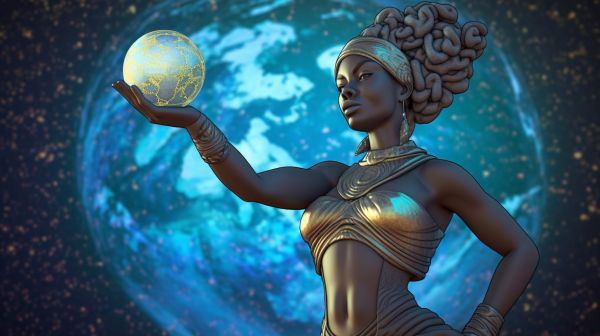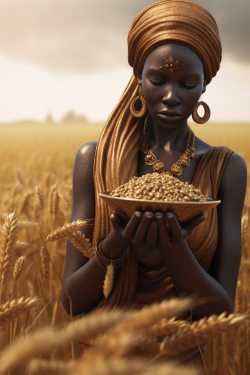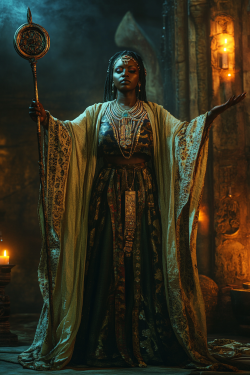Baksism
| Type | Polytheistic, Animistic |
|---|---|
| Races | Human |
| Organized | Yes |
| Founded | 1 IM |
| Deities | Ana, Jer, Adidi, Teniz, Nayza, Ferma, Awa, Buzaki |
Baksism is an animistic religion in which any creature, or geographic feature such as a river or mountain might be considered to possess a divine soul. The central figure of this religion is the creator, Ana, who gave birth to Otan. She then gave birth to seven children or Baksi, each with a specific role, to watch over the people and other creatures of the land.
The Tenets of Baksism[edit]
Adopting the Baksi religion is less a leap of faith and more of an entry into another world. To the practitioners of this faith, all things animate and inanimate may possess a spirit or soul. A skilled practitioner might speak to these souls to garner favour with them. They might convince an animal not to attack, a flower to bloom, or a river to calm its waters for a crossing.
Practitioners of Baksism will form themselves into a matriarchal hierarchy. With the exception of brief periods of transition, the supreme matriarch will carry the title of Queen Mother. The current Queen Mother in Karazalik does not lead the country's government, however, the government makes few (if any) decisions without her blessing and approval. This tacit arrangement has existed for as long as anyone remembers.
The Oral Tradition[edit]
Baksism is not a bookish religion and therefore relies on the oral tradition to be remembered from generation to generation. This is enabled by a frailty in the masculine spirit. While it is believed that women are born with perfect spirits, men come into this world with incomplete spirits.
Reincarnation is a tenet of Baksism and it is a difficult path for males. To achieve enough completeness of the spirit for a male to be worthy of reincarnation, they must undergo extensive spiritual education. This education is provided by the elders of any given settlement. The elders may be either male, female or some combination. Their constant and persistent recital of the oral tradition keeps both the teachers and students sharp on the tenets of Baksism. In exchange for the gift of a complete spirit, the males will provide gifts of food and other goods to the elders over the course of their education.
The Baksist Pantheon[edit]
As in most religions, Baksism posses all four elements of the divine: the creator, the messenger, the intercessor and the destroyer. Because of the religion's animistic roots, however the role of messenger can be almost any living or non-living thing on the planet which could possibly be a vessel for a soul.
The Creator[edit]
Eschewing philosophical and ontological arguments the practitioners of Baksism do not mince words. Their chief ontological argument is as follows: We exist; we were created; all things came to be, both physically and spiritually, by the act of birth; our birth mother is Ana.
The form of the creator in the Baksist religion is similar to many in that the creator. It is too large, to all-encompassing and too ineffable to receive direct communion from mere humans. In order for humans to communicate with the godhead, the creator gave birth to seven intercessors. The role of the intercessor is to interact with the people and other spirits on the planet and where necessary, intercede in their affairs.
The role of the creator is as follows:
- Ana: The World Mother
The Intercessors[edit]
Baksism features not one but seven intercessors. The seven Baksi were born to fulfill important roles in human and spiritual affairs. They take on elemental roles, air, water and earth, but they also take on roles involving war, agriculture and justice. These are the major avenues of human endeavor.
The role of the intercessor is fulfilled by the following gods and goddesses:
- Adidi: Baksi of Justice
- Awa: Baksi of Air
- Ferma: Baksi of Soil and Agriculture
- Janbir: Baksi of the Rain
- Nayza: Baksi of Iron and War
- Teniz: Baksi of the Sea
The Messengers[edit]
In the Baksist faith, nearly everything is in possession of what you would describe a spirit or soul. You might find yourself looking upon a mynah bird one day saying "Watch your back, watch your back." One might turn to discover they are being stalked by a python. This kind of helpful message is said to be a gift of Ana. They can rarely be explained. They are never duplicated.
The Destroyer[edit]
All things must end, and as in most religions, the Baksist faith has a destroyer. Unlike the fire and brimstone variety, however the destroyer is another Baksi, Buzaki, the Baksi of the Unpredictable. Buzaki would be analogous perhaps to something like a combination of Norns and Loki in the Wodenist religion. Buzaki representing the inevitability of an unpredictable fate. He is rarely depicted as evil, but humans having interactions with Buzaki tend to have famously bad outcomes.
The role of the destroyer is fulfilled by:
- Buzaki: Baksi of the Unpredictable, the Trickster
The Baksist Clergy[edit]
The Queen Mother[edit]
The Queen Mother is the sole and undisputed leader of the Baksism faith. All decisions regarding the faith and ultimately the leadership of the country of Karazalik fall under her dominion.
Religious Observances[edit]
Popular Folklore[edit]
| Copyright © 2021-2025 by Robyn Blaber and Will to Power Games. All rights reserved. Content on this website may not be reproduced without written permission of the copyright owner. |





